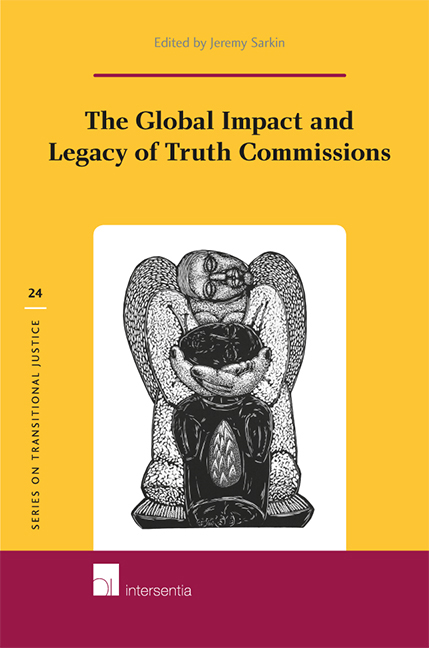Book contents
- Frontmatter
- Acknowledgements
- CONTENTS
- List of Contributors
- Introduction: Contextualising and Understanding the Global Role, Impact and Legacy of Truth Commissions
- Is Anyone Listening? A Review of the Research on Attitudes Towards Truth Commissions
- Assessing the Long-Term Impact and Legacy of Truth Commissions
- The Global Textual Legacies of Truth Commissions: Narratives on Sexual Violence in the Reports of Sierra Leone, Liberia, Kenya and Beyond
- The Implementation Record of Truth Commissions’ Recommendations in Latin America
- In the Aftermath of Truth: Implementing Truth Commissions’ Recommendations on Reparations – Following Through for Victims
- Truth Commissions and Social Justice: ‘Wishful Thinking or Not Very Thoughtful Wishing’?
- Transitioning Toward Dignity
- Towards an Understanding of How Truth Commissions Can Use Their Amnesty Powers to Enhance Their Impact and Legacy
- Truth Commissions in Non-Transitional Contexts: Implications for Their Impact and Legacy
- Surrogacy and Resistance: Evolving Patterns in Unofficial Truth Commissions and Truth Projects
- Index
Truth Commissions and Social Justice: ‘Wishful Thinking or Not Very Thoughtful Wishing’?
Published online by Cambridge University Press: 26 June 2019
- Frontmatter
- Acknowledgements
- CONTENTS
- List of Contributors
- Introduction: Contextualising and Understanding the Global Role, Impact and Legacy of Truth Commissions
- Is Anyone Listening? A Review of the Research on Attitudes Towards Truth Commissions
- Assessing the Long-Term Impact and Legacy of Truth Commissions
- The Global Textual Legacies of Truth Commissions: Narratives on Sexual Violence in the Reports of Sierra Leone, Liberia, Kenya and Beyond
- The Implementation Record of Truth Commissions’ Recommendations in Latin America
- In the Aftermath of Truth: Implementing Truth Commissions’ Recommendations on Reparations – Following Through for Victims
- Truth Commissions and Social Justice: ‘Wishful Thinking or Not Very Thoughtful Wishing’?
- Transitioning Toward Dignity
- Towards an Understanding of How Truth Commissions Can Use Their Amnesty Powers to Enhance Their Impact and Legacy
- Truth Commissions in Non-Transitional Contexts: Implications for Their Impact and Legacy
- Surrogacy and Resistance: Evolving Patterns in Unofficial Truth Commissions and Truth Projects
- Index
Summary
INTRODUCTION
Though there are debates about the definition, transitional justice is largely seen as ‘the full range of processes and mechanisms associated with a society's attempts to come to terms with a legacy of large-scale past abuses, in order to ensure accountability, serve justice and achieve reconciliation’. These measures include, amongst others, domestic and international(ised) trials, truth commissions, reparation programmes, vetting and lustration practices, documentation, memorialisation, legal reforms, and other efforts made to promote reconciliation. In general, the different processes aim to make a clear break from past abusive practices so that trust may be re-established between different groups in society and the state. They are largely based on the notion that backward-looking processes, namely those that acknowledge and address abuses suffered by victims, are necessary in order to help transition out of conflict or repression and into societies that respect democracy, human rights, and the rule of law.
Yet, despite the wide range of innovative responses that have been developed, it has become clear that the implementation of transitional justice processes is not a remedy for all of a society's problems. Nor should they be seen in this light. Rather, they are meant to help with the transition from authoritarian rule to democracy or from conflict to peace by addressing past abuses. Yet, as has Often been the case, past abuses are addressed in an unsatisfactory manner, or not addressed at all. Trials cannot prosecute all crimes, vetting processes cannot cover all institutions or individuals, and reparations cannot redress all harms suffered. Some of the most pertinent criticism of transitional justice processes is that they tend to be rooted in westernised, liberal and legalistic approaches to justice. They predominately focus on violations of civil and political rights (loss of life or violations of physical integrity), while largely ignoring violations of economic, social and cultural (ESC) rights, broader structures of inequality, poverty or corruption. Issues such as social, cultural or religious discrimination or exclusion, the erosion of livelihoods through corrupt practices by a small elite, the denial of worker rights, and interference with access to food, water, education and healthcare are Often left untouched by conventional transitional justice processes or only referred to as context, even when these problems are part of the specific abuses that took place.
- Type
- Chapter
- Information
- The Global Impact and Legacy of Truth Commissions , pp. 169 - 188Publisher: IntersentiaPrint publication year: 2019
- 1
- Cited by



